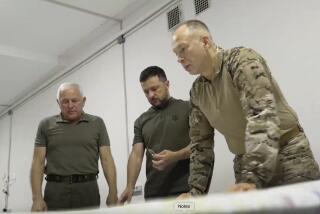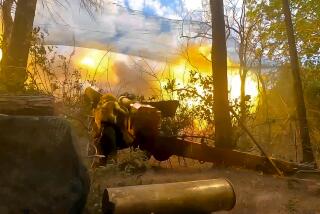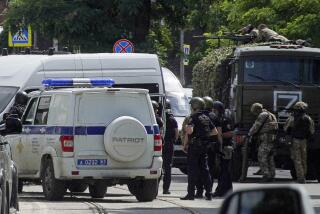Chechen Rebels Stage New Raids
- Share via
TERECHNOYE, Russia — On the second day of a Russian military assault that has done more damage to President Boris N. Yeltsin than to the Chechen separatists he is trying to crush, armed rebels Tuesday attacked a Russian-run power plant in Chechnya and a Russia-bound ferry in Turkey.
As federal troops continued Tuesday to rocket and shell the latest scene of an 8-day-old hostage drama, a few handfuls of wounded and hungry hostages escaped their Chechen captors by crawling to safety from the besieged village in southern Russia where they had been held.
Heavy snow and bitter winds hampered helicopter resupply of government troops reported to be moving house to house in the ruined and smoldering village of Pervomayskaya in search of Chechen holdouts.
Released hostages said federal paratroopers had driven the heavily armed Chechens to the southern end of the village but that fierce small-arms fighting continued and that the battle could go on for days.
While the military sought to shield the ruins of its purported hostage rescue from the outside world, fighters loyal to Chechnya’s president-in-hiding, Dzhokar M. Dudayev, staged two more daring raids.
At a power plant near the Chechen capital, Grozny, they seized at least 27 Russian and two Chechen night-shift workers and spirited them to an unknown location, Russia’s Independent Television reported.
And 20 masked Chechens seized a ferry in the Turkish port of Trabzon, rounded up and beat the Russians aboard and threatened to kill one Russian every 10 minutes unless it set sail, Turkey’s Anatolian News Agency reported. The Chechens claimed to have killed one Russian; a Russian woman who escaped told Anatolian that several people aboard were wounded.
It was unclear how many Russians were among the 120 passengers and 45 crew members on the ferry, which had been scheduled to cross the Black Sea to the Russian resort of Sochi.
Turkish officials sealed off the port and opened negotiations with the Chechens. Two hours later, the captain emerged from hiding aboard the vessel and set sail for an unknown destination.
Predominantly Muslim Turkey sympathizes with the Chechen separatist cause but has avoided pressing the issue for the sake of its relations with Moscow.
The protracted campaign to rout the hostage-takers in Pervomayskaya has added insult to injury in Yeltsin’s handling of the crisis in southern Russia. It took the Kremlin six days to launch the rescue operation that many fear has killed more of the estimated 150 hostages than it has saved.
Most of those who managed to flee the confusion of the federal assault and the Chechen rebels’ fierce resistance were herded into a “filtration camp” in the neighboring hamlet of Sovetskaya for fear they might be terrorists posing as freed hostages, military and local officials said.
“You can’t be too sure. The terrorists may have infiltrated the group claiming to be refugees,” Lt. Col. Grigory Odintsov of Russia’s Ministry for Emergency Situations responded when asked whether women and children fleeing Pervomayskaya were also being held for identification.
Russian media reported that as many as 29 captives had escaped from Pervomayskaya, but local authorities here knew of only 18.
One of the survivors, Abdurazak M. Mamedov, suffered multiple gunshot and shrapnel wounds in both legs from the federal artillery storm that began early Monday.
The 43-year-old truck driver from Kizlyar, where the hostage crisis began Jan. 9 with the Chechens’ seizure of nearly 3,000 captives, said he was wounded within the first half hour of the punishing government assault with helicopter gunships, tanks and mobile rocket launchers.
“The entire atmosphere of the storm was so tense that the [federal] troops could easily have mistaken me for a Chechen fighter and shot me too,” Mamedov, who is of Azerbaijani ethnicity, said from a grimy hospital bed in this village adjacent to Pervomayskaya.
Mamedov and three others of the 150 or so hostages he said were in the hands of the Chechen gunmen at Pervomayskaya had been kept in the attic of a farmhouse for four days before the assault began.
He criticized the Russian military for halting the Chechens as their commandeered bus convoy tried last Wednesday to cross to freedom in breakaway Chechnya about a mile south of this desolate village in the neighboring Russian republic of Dagestan.
The Chechens stormed Kizlyar and took captives to pressure Yeltsin to withdraw his forces from their tiny Muslim homeland. The gunmen negotiated with Dagestani authorities for safe passage to Chechnya with a smaller number of captives in return for release of most of those seized in Kizlyar. But federal combat helicopters blocked the rebels’ escape just short of the border in Pervomayskaya.
“They should never have stopped the convoy,” Mamedov complained, while acknowledging there was little else the government could have done to ensure that the terrorists were finally vanquished.
There have been no reliable casualty reports from Pervomayskaya. The Interior Ministry in Moscow said Tuesday that 60 rebels and four Russian soldiers had been killed in two days of fighting. But it was unclear how the Russians, in the heat of battle, had managed to distinguish between dead rebels and dead hostages. Mamedov could say only that there had been many killed and wounded.
Even the number of Chechen fighters dug into the village under the command of Salman Raduyev has varied in government reports from 500 down to 150.
Movladi Udugov, a rebel spokesman who is in radio contact with the besieged separatists, told Reuters news service that Raduyev was unharmed Tuesday after seven Russian attempts to seize his base in Pervomayskaya.
Federal authorities have provided little information about their effort to rout the gunmen loyal to Dudayev. They have also thrown up roadblocks to keep journalists and international aid workers away from vantage points such as the river embankment here that overlooks Pervomayskaya across a mile of frozen farmland.
Moving to mitigate criticism from abroad, Foreign Ministry spokesman Grigory Karasin said in Moscow that the Russian assault was planned “in accord with . . . principles worked out by democratic countries from their own experience of encounters with terrorism.”
Yeltsin’s December 1994 attack on Chechnya to put down Dudayev’s independence claims has spurred a wave of terrorism across once-stable Russia. Average citizens blame the president for miring the country in a conflict that has devastated their sense of security, and his nationalist and democratic opponents alike are using his pathetic record on Chechnya as a political battering ram.
In Moscow on Tuesday, Yeltsin’s opponents in parliament demanded a no-confidence vote against him. In the opening session of Russia’s newly elected Duma, or lower house, deputies stood in silence to commemorate those killed in the hostage crisis. The liberal Yabloko faction called for a no-confidence motion.
“It’s a political problem,” said Gennady A. Zyuganov, leader of the dominant Communist Party bloc. “You don’t solve it with artillery and helicopters.”
But further discussion of such a motion was delayed.
Outside the building, about 70 Russians demonstrated against Yeltsin’s war, some waving Soviet flags. A separate group of 20 rallied in support of the president.
Times staff writer Richard Boudreaux in Moscow contributed to this report.
More to Read
Sign up for Essential California
The most important California stories and recommendations in your inbox every morning.
You may occasionally receive promotional content from the Los Angeles Times.













